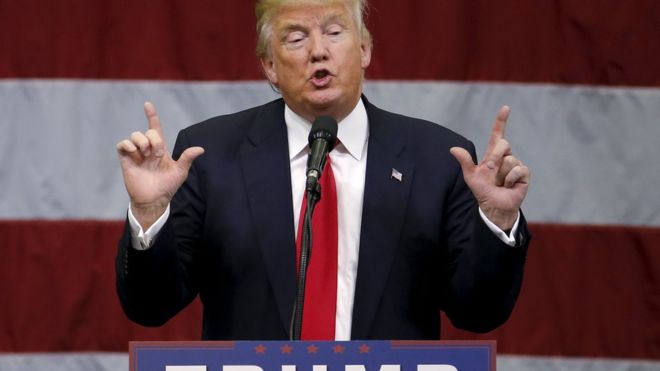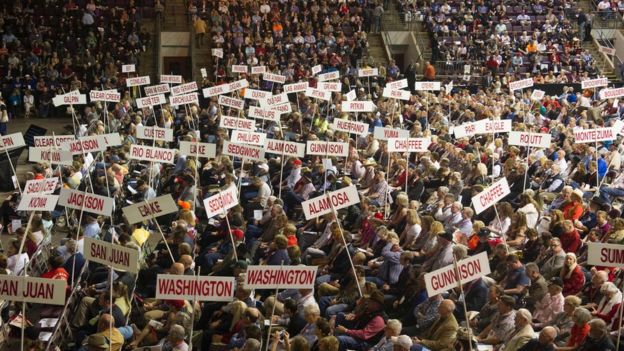US election: Trump accuses Republican leaders of conspiracy
US election: Trump accuses Republican leaders of conspiracy
- 3 hours ago
- US Election 2016
 Reuters
Reuters
Republican Donald Trump has said the party's leaders do not want him to win the presidential nomination.
The system was "stacked" against him, he said in New York, accusing the Republican National Committee (RNC) of conspiring against him.
His comments come after his rival Ted Cruz was awarded all the delegates in Colorado without a state-wide vote.
Mr Trump leads the race but may fall short of getting enough delegates to get the nomination outright.
That would lead to a contested convention in July, where delegates are free after the first ballot to back whom they want, opening the door for Texas Senator Mr Cruz or even the third candidate in the race, John Kasich.
The Washington Post reported on Wednesday that Mr Cruz is likely to win on a second vote, because he has persuaded so many delegates to vote for him when they are "unbound" to vote as pledged.
But Republican National Committee chairman Reince Priebus rejected Mr Trump's charge that the rules in states like Colorado had been changed in response to his rise in the polls.
 AFP
AFP
Mr Priebus tweeted that the nomination process had been well known for more than a year.
"It's the responsibility of the campaigns to understand it. Complaints now? Give us all a break."
Asked at a town hall event in New York whether the RNC wanted him to win, Mr Trump said: "No, I don't think so. I really don't."
He has been criticised for not campaigning hard enough on the ground in states like Colorado.
But Mr Trump said delegates who wanted to support him were being pushed out by the RNC.
"They don't like when I put up my own money because it means they don't have any control of me because I'm working for the people," he said.
Analysis - Anthony Zurcher, BBC North America reporter
Donald Trump's insurgent presidential candidacy has proven to be extremely successful in besting a fractured Republican field at the ballot box, propelling him to a commanding lead in the race for the nomination.
What his campaign has not been built to do is engage in the gruelling, behind-the-scenes political combat that comes in the weeks and months after the headline-generating nominating contests. Although Mr Trump has received almost 2 million more votes than Ted Cruz, it's the Texas senator who is prevailing in the unglamorous race to ensure that the Republican National Convention floor is packed with loyalists who, in a nominating free-for-all, will stand by their candidate.
Before Mr Trump complains too loudly about the undemocratic nature of the process, however, it should be noted that at least so far he's won a larger share of pledged convention delegates (45%) than he has of the raw vote in nomination contests (37%).
In this close, contentious primary season, the veneer of accountability is rubbing off, exposing the sometimes unsightly gears that still power the US political system. It isn't a pretty sight - and it's difficult for anyone to claim the moral high ground.
Most states have opted to hold state-wide primaries or caucuses to determine the number of delegates pledged to a particular candidate.
But Colorado decided last summer to select its delegates in a different way, at its own state convention.
The state-by-state primary contests come to New York next week where a high number of delegates will be up for grabs.
Several senior Republicans have expressed opposition to Mr Trump winning, doubting his ability to win a general election and disagreeing with his hard line on immigration.
Mr Trump has broken an earlier pledge he made to support whoever the Republicans nominate, therefore refusing to rule out a third-party run.
He has said there will be "riots" if he is not chosen as the party's nominee, having headed to the convention with the most delegates.
Comments